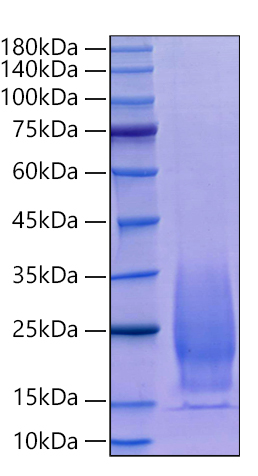Description
Recombinant Human Prostate stem cell antigen/PSCA Protein
The Recombinant Human Prostate stem cell antigen/PSCA Protein is a biologically active recombinant protein that plays a significant role in various cellular processes and signaling pathways in human biology. This protein is widely employed in immunological research, cell biology studies, protein-protein interaction analyses, and therapeutic development, providing researchers with a reliable tool for investigating Prostate stem cell antigen/PSCA function and its implications in health and disease.
This product (SKU: RPCB1465) is produced using HEK293 cells and features a C-His tag for convenient detection and purification. The protein exhibits a calculated molecular weight of 9.06 kDa with an observed molecular weight of 15-35 kDa under denaturing conditions, achieving ≥ 95 % as determined by SDS-PAGE., ensuring exceptional quality and consistency for research applications.
Key Features
| High Purity by Affinity Chromatography | |
| Mammalian & Bacterial Expression Systems | |
| High lot-to-lot consistency via strict QC |
| Product Name: | Recombinant Human Prostate stem cell antigen/PSCA Protein |
| SKU: | RPCB1465 |
| Size: | 10 μg , 20 μg , 50 μg , 100 μg |
| Reactivity: | Human |
| Synonyms: | PSCA, PRO232 |
| Tag: | C-His |
| Expression Host: | HEK293 cells |
| Calculated MW: | 9.06 kDa |
| Observed MW: | 15-35 kDa |
| Gene ID: | 8000 |
| Protein Description: | High quality, high purity and low endotoxin recombinant Recombinant Human Prostate stem cell antigen/PSCA Protein (RPCB1465), tested reactivity in HEK293 cells and has been validated in SDS-PAGE.100% guaranteed. |
| Endotoxin: | < 0.01 EU/μg of the protein by LAL method |
| Purity: | ≥ 95 % as determined by SDS-PAGE. |
| Formulation: | Lyophilized from sterile PBS, pH 7.4. Normally 5 % - 66 % trehalose is added as protectants before lyophilization. |
| Reconstitution: | Reconstitute with deionized water |
| Storage: | Store at -20℃.Store the lyophilized protein at -20℃ to -80 ℃ up to 1 year from the date of receipt. After reconstitution, the protein solution is stable at -20℃ for 3 months, at 2-8℃ for up to 1 week. |
This gene encodes a glycosylphosphatidylinositol-anchored cell membrane glycoprotein. In addition to being highly expressed in the prostate it is also expressed in the bladder, placenta, colon, kidney, and stomach. This gene is up-regulated in a large proportion of prostate cancers and is also detected in cancers of the bladder and pancreas. This gene includes a polymorphism that results in an upstream start codon in some individuals; this polymorphism is thought to be associated with a risk for certain gastric and bladder cancers. Alternative splicing results in multiple transcript variants.







